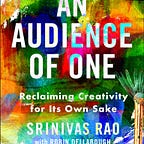You Can’t Copy and Paste Someone Else’s Path to Success
“You can’t copy and paste someone else’s path to success” — Ozan Varol
In 2009, designer Jamie Varon started a job search campaign called Twitter Should Hire Me. Her campaign led to national media attention and dozens of job offers. After reading Jamie’s story, I started my first blog, 100 Reasons You Should Hire Me. I tried to copy and paste someone else’s path to success and ultimately failed.
When people read books, take courses or work with coaches, they copy and paste someone else’s path to success, create derivative work that’s dead on arrival, and assume the advice, not their interpretation, was flawed.
If you want to become successful on YOUR terms, check out our free creative project planner. It will help you make rapid progress towards your goals in under 15 minutes a day and finish what you start.
Everyone is Full of Shit to Varying Degrees (Including Me)
When I teach a class or workshop, the first thing I tell people is to consider the possibility that everything I’m telling them is bullshit. It might be for them.
- Prescriptive advice is a framework, not a formula, and the variable that throws off the formula is the person applying the advice.
- It doesn’t matter if someone is an influencer, thought leader, or expert. Everyone is full of shit to varying degrees. And the advice they are giving you might be bullshit.
A genius in one context is an idiot in another.
Why a lot of prescriptive advice is bullshit
Bad prescriptive advice sounds good in self-help books, graduation speeches, and motivational seminars. But it’s often based on pseudoscience and anecdotes instead of genuine evidence.
When you treat principles like prescriptions and don’t question the source of the Information, it’s like taking viagra to alleviate a headache and wondering why you end up with a hard-on.
Two traps cause people to copy and paste someone else’s path to success.
The Mimicry Trap
People fall into the mimicry trap when they overlook the difference between causation and correlation. When prescriptive advice is effective, there are always hidden variables in causality.
- Writing 1000 words a day changed my life and led to a six-figure book contract. But I was also one of the first 500 writers on Medium and the beneficiary of an endorsement from Glenn Beck. Those are variables that another aspiring author can’t replicate.
- When Derek Halpern started Social Triggers, another blogger copied the design of his website. But that blogger didn’t account for the fact that Derek had years of experience and had built a website with millions of visitors before starting Social Triggers.
- A popular podcaster says everyone should start a podcast but doesn’t mention that the success of his podcast was contingent on the fact that 100,000 people subscribed to his newsletter before starting a podcast.
- If every person reading this applied Benjamin Hardy’s advice about what it takes to become a millionaire, very few would become millionaires.
The danger of mimicking tactics is that people don’t account for the underlying factors that make those tactics effective.
Avoiding the Mimicry Trap
To avoid the mimicry trap, you have to connect what you learn to what you know. That’s how information evolves into knowledge and wisdom.
Say you sign up for an online course about starting an interview-based podcast. Some proven principles for conducting a podcast interview include choosing interesting guests, asking good questions, and telling a great story.
If you copy and paste the instructor’s path to success and choose similar guests, you’ll get caught in the mimicry trap. This is why so many podcast listeners feel like they hear the same guests saying the same thing on 100’s of podcasts.
But suppose you apply proven principles in an original context and tell someone’s story by interviewing three different people from their life and recording their responses. In that case, you’re more likely to create an interview-based podcast that stands out in a sea of noise.
Variables to Consider
You always have to account for variables that determine the effectiveness of prescriptive advice. Timing, genetics, skill, and life circumstances all play a role.
- Timing: Tactics have a shelf life. What works for one person won’t always for another person at another time. All established knowledge eventually becomes obsolete.
- Strengths and Weaknesses: When you acknowledge limitations to capitalize on Strengths, your odds of success increase.
- Life Circumstance: The same advice that produces outstanding results for a 20-something single male could produce disastrous results for a mother with three children.
Start with your natural strengths, modify the advice you receive accordingly, and never follow anyone’s advice to the letter.
The Outlier Trap
Stories about outliers are ripe with survivorship bias. The availability heuristic distorts our perception of the validity of prescriptive advice.
Outlier stories that are available to us are about people who’ve been successful. People who died penniless and broke don’t give TEDtalks, write self-help books or appear on the cover of magazines. This is why outliers are lousy models for the rest of us.
Avoiding The Outlier Trap
You can’t copy and paste someone else’s path to success when you apply meaningless platitudes people mistake for business strategies
- You’re probably going to become the next Steve Jobs, Oprah, or Beyonce.
- Working 120 hours a week won’t make you as successful as Elon Musk.
As author Sid Mohasseb says, you are not them.
If you aren’t aware of how cognitive biases distort your perception of prescriptive advice, it’s more likely to lead to disaster than discovery. The variables to consider are the same as those for avoiding the mimicry trap.
Only is Better Than Best
Becoming the best is a zero-sum game and a fool’s errand. At best, you become a pale imitation of your predecessors. When you focus on your personal best instead of the comparative best, you discover what makes YOU unmistakable.
